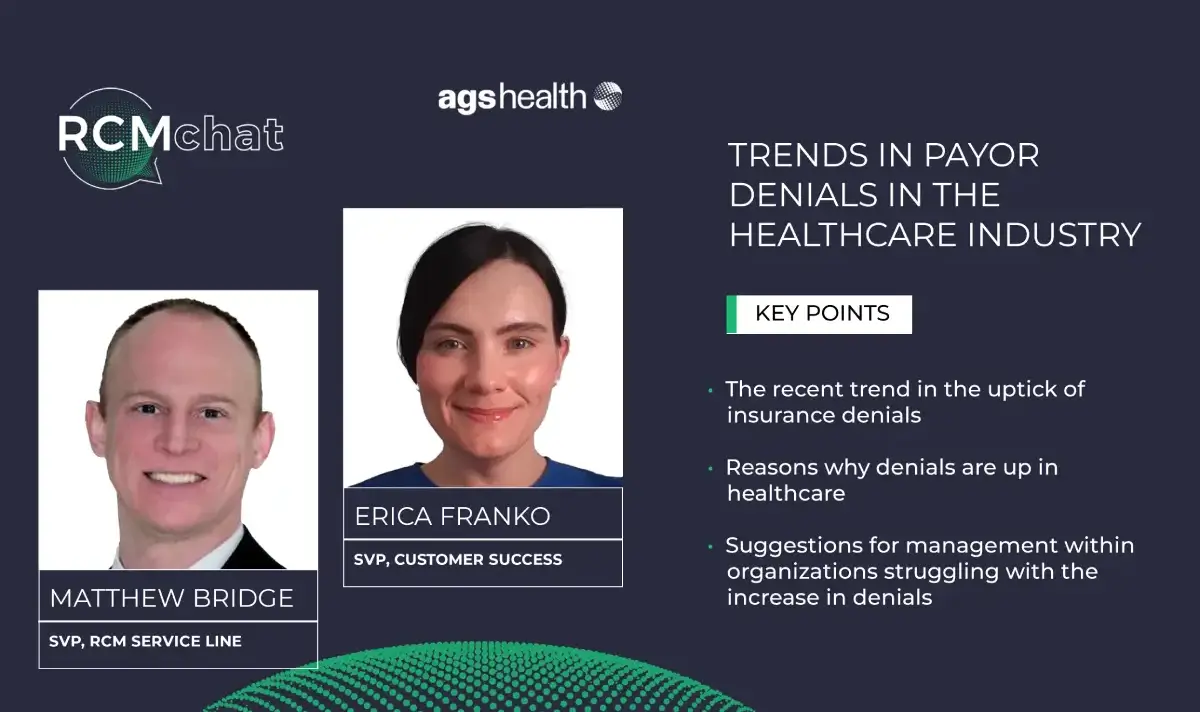Receiving insurance coverage for patient services is becoming increasingly complex, with nearly 17 percent – almost one in every five – in-network healthcare claims denied in 2021. The COVID-19 pandemic has further exacerbated this trend, as payors have tightened their requirements for provider reimbursement due to decreased volumes and cancellations of elective procedures. Meeting reimbursement criteria is a laborious process that has significantly increased denials. Patient access and financial clearance account for approximately 50% of all denials, making it crucial to secure financial clearance before services are rendered.
The emergence of evolving care delivery models, such as telehealth services and the involvement of non-physician practitioners, adds more layers of complexity to claims processing. Additionally, the constantly changing rules and regulations surrounding reimbursement requirements make it even more challenging. Obtaining authorizations has become more complex, requiring specialized expertise and a deep understanding of payor-specific rules. Retail healthcare settings, such as local pharmacies, also pose unique challenges due to the lack of an established revenue cycle infrastructure and payment models that resemble traditional retail transactions.
To address existing denials, healthcare organizations need a multifaceted approach that aligns operating procedures, technology systems, and complementary resource strategies. Capturing denial data, understanding root causes, and establishing the right technology and workflows are essential steps to resolve denials efficiently. Holding payors accountable for inappropriate claim denials and monitoring denial trends can also improve outcomes.
Of course, the ultimate goal is to prevent denials, which requires a proactive and data-driven approach. Preventing denials involves gaining a comprehensive understanding of the revenue cycle and identifying areas that contribute to denials. Establishing a council task force with stakeholders from across the revenue cycle can help create alignment to drive improvements that bridge gaps in the cycle and define standard processes to address specific denial issues. Quantifying denials through analytics and leveraging insights from frontline staff can uncover trends and support targeted prevention strategies.
Outsourcing solutions can also help prevent internal resources from being overwhelmed and enable more timely denial management. For example, with inventory building, a large academic medical center in the northeast needed a denial management services partner that could scale quickly and identify the root cause of their growing denials problem. By outsourcing coding denial management to AGS Health , the health system achieved a 72% decrease in the denial inventory within 6 months, achieved net collections of $1.4 million on a balance of $2.7 million, and achieved a $4 million net revenue impact resulting in 40% cost savings.
By understanding the root causes, implementing effective denial management strategies , and preventing denials through process improvements and payor accountability, healthcare organizations can mitigate the financial burden and maximize reimbursement. There is no question that managing denials is a labor-intensive and sometimes overwhelming process. As healthcare organizations are facing limited staffing levels, outsourcing solutions can help with timely denial management while also freeing up internal resources. Healthcare organizations need to embrace a consultative mindset that combines prioritizing outcome-focused interventions with effective technology-driven solutions to successfully navigate the challenges of denials and recognize an increased return on investment.
Listen to the recent AGS Health RCMChat podcast to hear more.

As senior vice president of RCM services at AGS Health, Matt oversees strategic growth initiatives for the company’s Patient Access and Patient Financial Services business units. He possesses more than 15 years of experience in professional and managed services with expertise throughout the revenue cycle continuum. Matt’s career has provided him with broad experiences covering diverse provider settings and a deep understanding of the challenges facing customers of all provider types. He is passionate about mentoring and coaching others as they pursue their career journeys in revenue cycle and healthcare business management. Matt possesses a bachelor’s degree in business administration and management from Curry College in Milton, MA.
AGS Health
Author
AGS Health is more than a revenue cycle management company—we’re a strategic partner for growth. Our distinctive methodology blends award-winning services with intelligent automation and high-touch customer support to deliver peak end-to-end revenue cycle performance and an empowering patient financial experience.
We employ a team of 12,000 highly trained and college-educated RCM experts who directly support more than 150 customers spanning a variety of care settings and specialties, including nearly 50% of the 20 most prominent U.S. hospitals and 40% of the nation’s 10 largest health systems. Our thoughtfully crafted RCM solutions deliver measurable revenue growth and retention, enabling customers to achieve the revenue to realize their vision.



